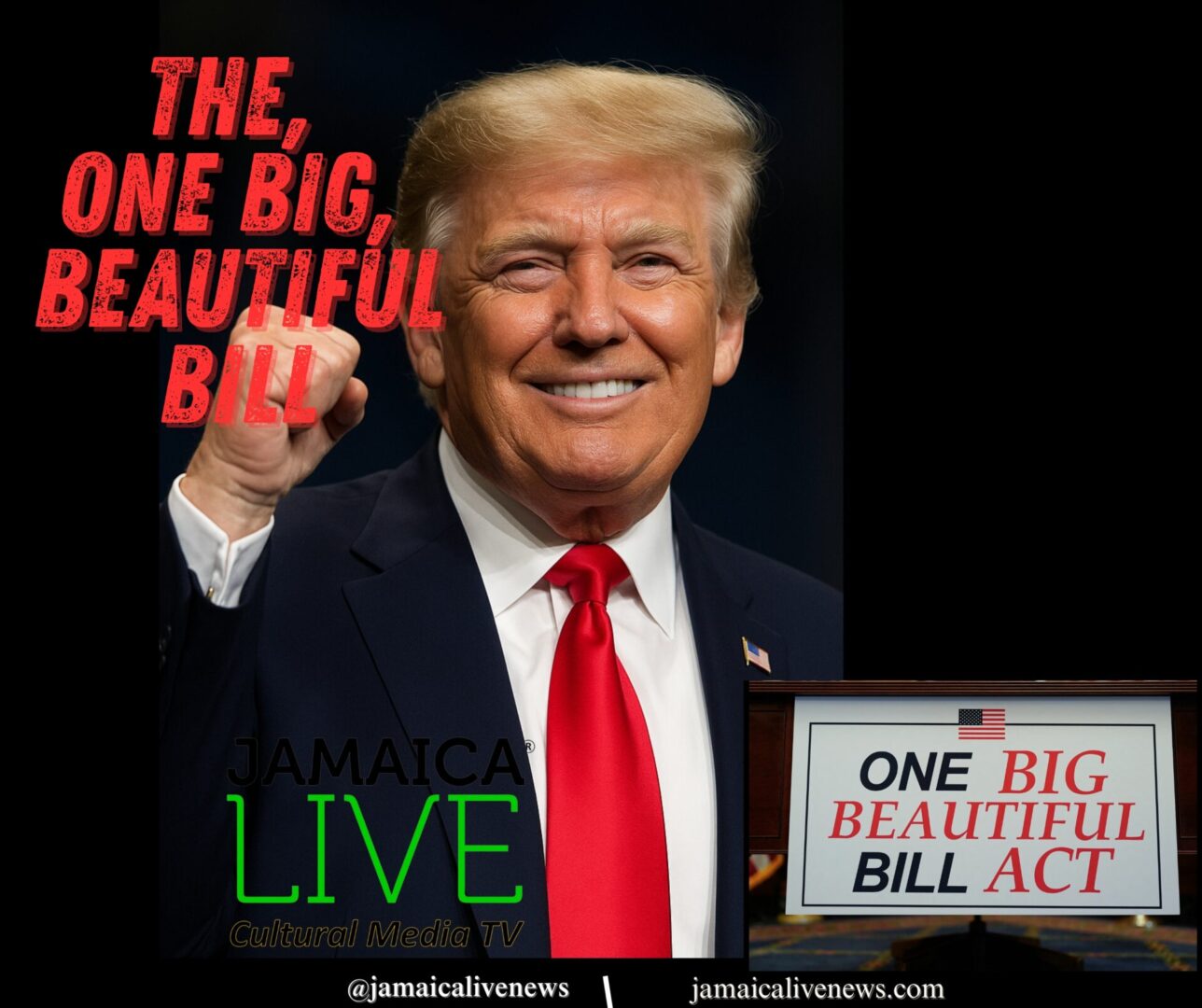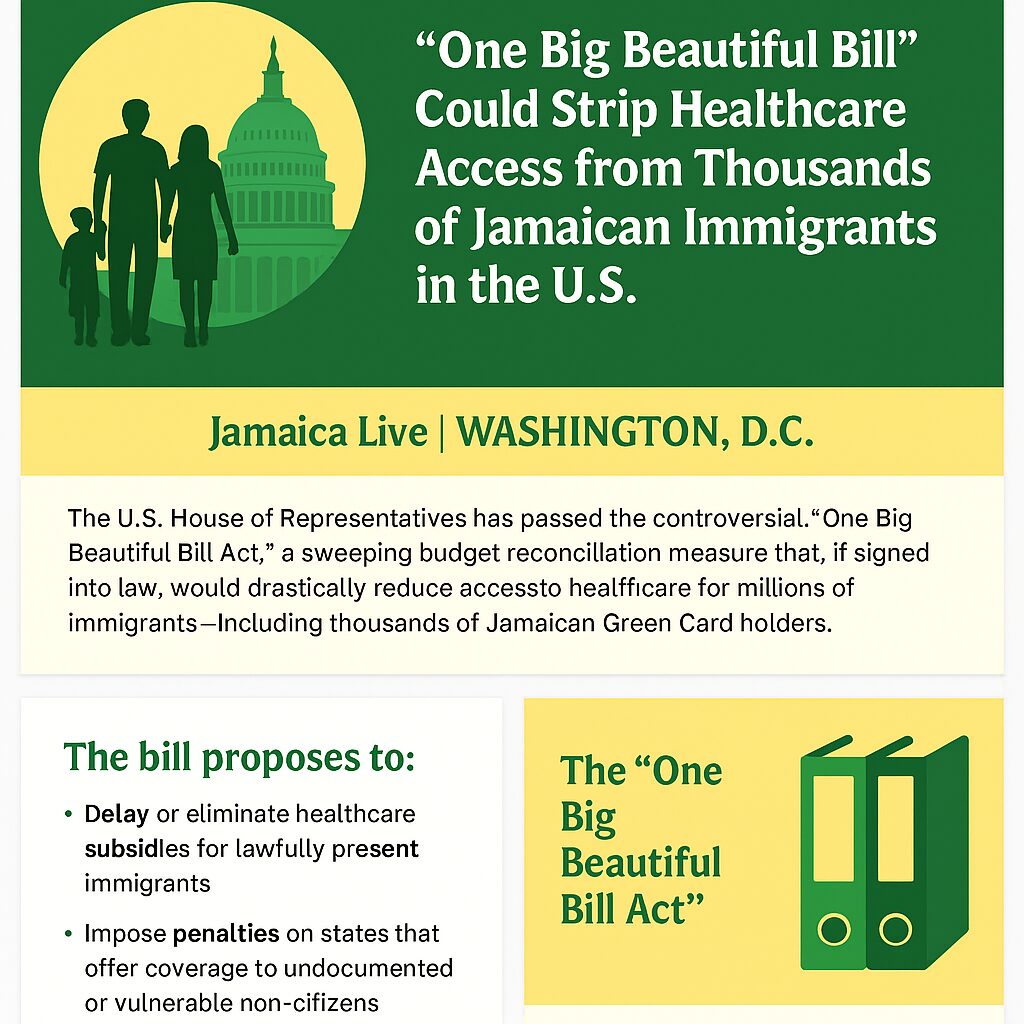“One Big Beautiful Bill” Will Strip Healthcare Access from Thousands of Jamaican Immigrants in the U.S.
Jamaica Live | Washington, D.C.
Jamaica Live News Desk: July 10, 2025
The U.S. House of Representatives has passed the controversial“One Big Beautiful Bill Act,” a sweeping budget reconciliation measure will drastically reduce access to healthcare for millions of immigrants—including thousands of Jamaican Green Card holders. The bill proposes to delay or eliminate healthcare subsidies for lawfully present immigrants, impose penalties on states that offer coverage to undocumented or vulnerable non-citizens, and erect new bureaucratic barriers for recent legal residents seeking coverage.

Jamaican nationals holding U.S. Green Cards could face significant challenges accessing health coverage if when the One Big Beautiful Bill Act becomes law. Approved by the U.S. House of Representatives on May 22, 2025, this sweeping legislation would dramatically reshape health insurance eligibility for immigrants, particularly those who are lawfully present but not yet U.S. citizens—including Lawful Permanent Residents (LPRs), better known as Green Card holders.
What’s in the Bill?
The legislation, passed largely along partisan lines, proposes to:
- Eliminate or delay eligibility for federal premium tax credits (PTC) for many lawfully present immigrants purchasing insurance on the Affordable Care Act (ACA) Marketplace.
- Impose financial penalties on states that offer health coverage to undocumented immigrants and certain categories of lawfully present non-citizens, including children and humanitarian parolees.
- Disqualify DACA recipients and other vulnerable groups from receiving any insurance subsidies.
Why This Matters to Jamaicans in the U.S.
For Jamaicans who have migrated legally to the United States and obtained Green Cards—many of whom are employed in low-wage sectors such as healthcare, hospitality, and construction—this bill poses a direct threat to their ability to access affordable medical care during their first five years in the U.S.
Currently, Green Card holders who fall below the federal poverty line can receive subsidized healthcare coverage through the ACA’s Marketplace if they’re ineligible for Medicaid due to their immigration status. The new bill would remove this safety net, leaving new LPRs in a five-year “coverage gap.”
For example:
- A Jamaican single mother who recently became a Green Card holder and earns minimum wage would no longer qualify for Medicaid or ACA subsidies.
- Without subsidies, health insurance premiums could be prohibitively expensive—leading many to forgo insurance entirely.

Impact in Numbers
The Congressional Budget Office (CBO) estimates the bill would:
- Result in 1.3 million individuals losing coverage.
- Cut $124 billion in federal spending on immigrant healthcare subsidies over the next decade.
Additionally, an estimated 1.4 million immigrants would lose state-funded coverage as states shut down programs to avoid new financial penalties attached to offering healthcare to undocumented or certain legally present immigrants.
Groups That Would Be Shut Out
The bill would permanently or temporarily deny coverage access or subsidies to:
- Refugees and asylum seekers
- Victims of trafficking and violence
- DACA recipients
- Humanitarian parolees (including many fleeing crisis zones)
- Children granted special immigration status
These groups—many of whom previously qualified for ACA subsidies or Medicaid under federal law—would either be forced to wait five years or be excluded entirely.
Ripple Effects
Jamaican families, particularly new immigrants, would face steep health costs during their most vulnerable years in the U.S. This could:
- Deter family reunification efforts, as Jamaican sponsors may be financially burdened by uninsured relatives.
- Increase reliance on emergency care, which is more expensive and harder to navigate for low-income immigrants.
- Overwhelm community clinics and charitable providers, many of which already serve high numbers of Caribbean immigrants.
Critics Speak Out
Immigrant advocacy organizations, public health experts, and some state governments have sharply criticized the bill. They argue that it punishes legal immigrants, undermines public health, and threatens state efforts to offer humanitarian support.
Jamaican-American immigration attorney Monique Sinclair said, “This bill would set back immigrant integration by decades. It sends the message that even legal immigrants who play by the rules, pay taxes, and contribute to society are undeserving of basic healthcare.”
What Comes Next?
The bill must now go to the U.S. Senate, where it faces strong opposition. Advocacy groups are pushing for key revisions, especially around:
- Restoring PTC access for lawfully present immigrants
- Removing penalties for state-funded immigrant healthcare programs
- Protecting vulnerable populations such as DACA recipients and humanitarian parolees
If enacted in its current form, the bill would take effect starting in Plan Year 2026 for Marketplace eligibility, and in October 2027 for state Medicaid funding penalties.
Advice for Jamaicans
Jamaicans in the U.S. should:
- Review their health insurance options annually
- Monitor the bill’s progress in the Senate
- Speak with immigration or healthcare advisors to understand how the changes may affect them
- Participate in advocacy efforts if they oppose the proposed changes
Final Word
The One Big Beautiful Bill Act is more than just a budgetary tool—it’s a political statement on who deserves access to healthcare in America. For thousands of Jamaican Green Card holders, the message is troubling: You are welcome to live and work here—but you may have to wait five years to see a doctor.
Stay tuned to Jamaica Live for updates on how this bill evolves and what it means for the Caribbean diaspora in the U.S.
